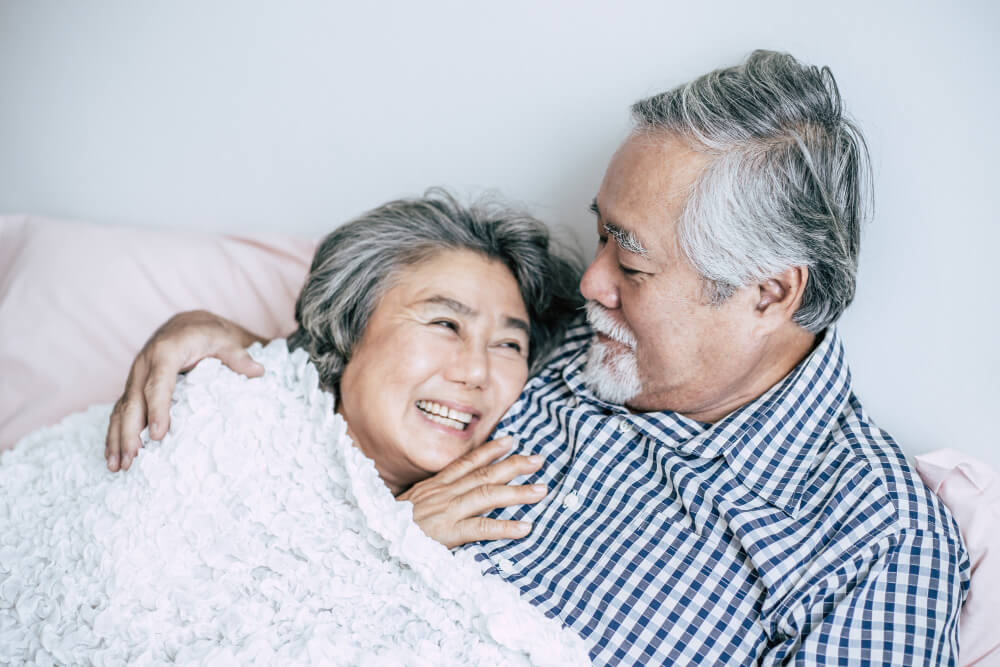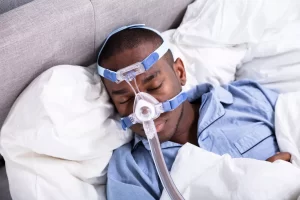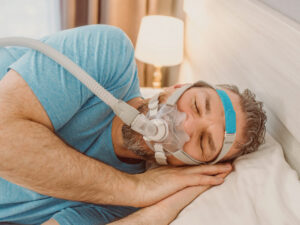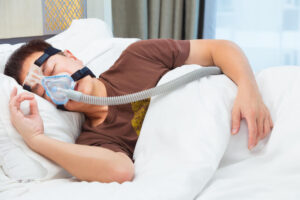Are you struggling with sleep apnea and looking for a natural way to cure it at home without CPAP? Sleep apnea is a serious condition that affects many people and can lead to further health complications if left untreated.
Luckily, there are ways to treat this condition naturally from the comfort of your own home. In this article, we will discuss how to cure sleep apnea naturally at home without CPAP.
Sleep apnea is a common disorder that causes one’s breathing to stop and start during their sleep, resulting in poor quality of rest and leaving one feeling tired throughout the day.
It can be caused by several factors such as being overweight or having high blood pressure. Left untreated, it can increase the risk of stroke, heart attack and other cardiovascular problems. That’s why it’s important to get treatment as soon as possible.
Fortunately, there are also few solutions available that don’t require the use of CPAP machines or other medical devices.
We’ll explore some natural alternatives that you can do right from the comfort of your own home in order to get better sleep and improve your overall health.
Definition Of Sleep Apnea
Sleep apnea is a sleep disorder which causes pauses in breathing during sleep. It affects over 18 million adults in the US, with many more cases going undiagnosed.
The pauses can last from several seconds to minutes, and can happen up to hundreds of times a night. As oxygen levels drop during these episodes, blood oxygen levels can also drop. This can cause significant health issues such as fatigue and high blood pressure.
- The most common type of sleep apnea is called obstructive sleep apnea (OSA). OSA occurs when the throat muscles relax and narrow the airway, causing shallow or complete cessation of breathing while sleeping.
- Central sleep apnea (CSA) on the other hand, is caused by the brain not sending signals to the muscles that control breathing. Mixed sleep apnea combines both OSA and CSA symptoms.
Though there are treatments available for those with sleep apnea, such as CPAP machines or oral appliances, some people may be interested in natural remedies instead. Fortunately there are a few ways to treat this condition without using medical devices or medications.
Common Symptoms of Sleep Apnea
Common symptoms of sleep apnea include loud snoring, difficulty staying asleep, daytime fatigue, headaches in the morning, dry mouth or sore throat upon waking, and restless legs syndrome.
It’s also important to note that sleep apnea can increase the risk of other medical conditions such as high blood pressure, stroke, heart failure, diabetes, and depression. Because of this, it’s important to seek treatment if any of these symptoms are present.
There are several natural remedies available for treating sleep apnea without the use of a CPAP machine. These include losing weight if necessary, avoiding alcohol before bedtime, sleeping on your side instead of your back, avoiding caffeine late at night, and using nasal strips to open up the airway during sleep. If these methods don’t work or if the symptoms worsen over time then medical attention should be sought out for further evaluation.
Risk Factors
The first risk factor is age, as studies have found that sleep apnea is more common in adults over 40 years old.
Obesity can also be a contributing factor, as it can lead to excess tissue and fat around the neck, which can narrow the airway and cause snoring. Other risk factors include smoking, alcohol consumption, large tonsils or adenoids, and family history of sleep apnea.
Genetic predispositions may also play a role in whether someone develops sleep apnea or not. People with certain genetic conditions like Down’s Syndrome or Prader-Willi Syndrome have an increased likelihood of developing sleep apnea due to their anatomical structure or medical issues they may already be dealing with.
Similarly, race and gender can be significant factors as well; African Americans and men are more likely to suffer from this disorder than other groups.
Therefore, understanding the risk factors associated with sleep apnea is essential for anyone wanting to cure their condition without CPAP therapy.
By making lifestyle changes such as reducing alcohol consumption and quitting smoking, maintaining a healthy weight through regular exercise and good nutrition, and monitoring for any underlying conditions that could increase your chances of having obstructive sleep apnea, you can take effective steps towards curing your condition naturally at home.
Diagnosis
Diagnosing sleep apnea can be done through a variety of methods. The most common way is to undergo a sleep study, which involves monitoring your sleeping patterns and breathing while you sleep.
This can help the doctor identify any pauses in your breathing or changes in your oxygen levels. Other tests that may be used to diagnose sleep apnea include an electrocardiogram (ECG), an echocardiogram, and a polysomnogram.
Your doctor may also ask about your medical history and perform a physical exam, including an examination of your throat, nose and mouth. They may also ask about any medications you’re taking and whether you have family members with sleep disorders.
If any of these tests indicate that you have sleep apnea, it’s important to talk to your doctor about the best treatment plan for you.
Treatment options may include lifestyle modifications such as weight loss or avoiding alcohol before bedtime, or they may involve using a CPAP machine or other medical device to help regulate your breathing during sleep.
Conventional Treatments
The first thing to consider when looking into treatments for sleep apnea is conventional treatments. These include lifestyle changes, such as weight loss and avoiding alcohol, quitting smoking, and eliminating other stimulants before bedtime.
Other treatments may include using a continuous positive airway pressure (CPAP) machine, which delivers air through a mask to keep the airways open during sleep.
Surgery may also be an option for some people with sleep apnea. In extreme cases, an oral appliance may be used to reposition the jaw or tongue in order to keep the airway open during sleep.
If lifestyle changes are not enough to improve symptoms of sleep apnea, a doctor may recommend CPAP therapy. CPAP machines deliver pressurized air through a mask while you sleep in order to keep your airway open. While CPAP is the most effective treatment for sleep apnea, it can be difficult for some patients to adjust to wearing the mask throughout the night.
Surgery is another option for treating sleep apnea. Depending on the cause of the condition, surgery may involve removing excess tissue from the throat or repositioning your jaw or tongue in order to open up the airway during sleep. Surgery can be effective in reducing symptoms of sleep apnea but it does carry some risk and should be discussed with your doctor before proceeding. Oral appliances are also available that can help position the tongue or jaw in order to keep your airway open during sleep.
No matter what treatment you choose, it’s important to speak with your doctor about any potential risks and side effects associated with each option before making a decision on how best to treat your condition.
Natural Remedies
While conventional treatments are effective, many people prefer to try natural remedies at home. Natural remedies are typically more cost-effective and less intrusive than CPAP machines. Here are some ways to naturally treat sleep apnea.
One of the most effective natural remedies for treating sleep apnea is losing weight. Studies have shown that individuals who carry excess weight around their neck and torso are at an increased risk of developing sleep apnea. Losing just a few pounds can reduce the severity of symptoms and allow them to breathe more freely while sleeping.
Another natural remedy for sleep apnea is avoiding alcohol consumption before bedtime. Alcohol relaxes the throat muscles, significantly increasing the risk of upper airway obstruction during sleep. Additionally, abstaining from sleeping pills or sedatives can help improve breathing patterns throughout the night.
Making lifestyle changes such as these can be difficult, but they may be necessary to treat mild cases of sleep apnea without medications or CPAP machines. Creating a consistent nighttime routine with healthy habits can help ensure restful nights and improved breathing patterns in those suffering from sleep apnea.
Dietary Changes
Making dietary changes can be a helpful natural way to treat sleep apnea. By eating healthy, nutritious meals and snacks, you can help reduce the symptoms of sleep apnea.
Eating smaller meals more frequently throughout the day is recommended for people with this condition. This will help keep your weight at an appropriate level, which helps reduce the risk of developing obstructive sleep apnea.
In addition to eating smaller meals, it’s important to focus on foods that are rich in vitamins and minerals. Eating fresh fruits, vegetables, lean proteins and whole grains can help improve overall health and reduce symptoms of sleep apnea.
Additionally, avoiding processed foods and sugary snacks is important if you want to maintain a healthy weight and reduce your risk of developing sleep apnea.
Drinking plenty of water throughout the day is also beneficial for managing sleep apnea symptoms. Staying hydrated helps flush toxins from your body and keeps your airways clear while you are sleeping.
Drinking herbal teas such as chamomile or peppermint tea can help relax your body and promote better quality sleep. Making these dietary changes can go a long way in helping manage sleep apnea without the use of CPAP machines or other medical equipment.
Exercise And Posture Adjustments
Exercise and posture adjustments can also be beneficial in treating sleep apnea. Aerobic exercises, such as jogging, swimming, or biking, help increase lung capacity and muscle strength. This can help reduce snoring and improve breathing during sleep.
It has been proven that yoga poses like the bridge pose and shoulder stand help open the airways to improve airflow. Strengthening exercises for the neck muscles are also useful in improving posture during sleep, which can help reduce symptoms of sleep apnea.
In addition to physical exercise, there are certain sleeping postures that can be helpful in relieving sleep apnea symptoms.
Sleeping on your side instead of your back helps prevent your throat from collapsing, which can restrict airflow. Using a body pillow or a special foam wedge to support your head while you sleep can also keep your airways open by elevating your upper body slightly above the horizontal position.
Making these lifestyle changes may not be easy but they are essential in curing sleep apnea naturally at home without CPAP. With some dedication and perseverance, it is possible to improve breathing patterns during sleep and reduce the severity of symptoms associated with this condition.
Relaxation Techniques
Relaxation techniques can be an effective way to manage sleep apnea at home. Practicing deep breathing and meditation exercises can help reduce stress and anxiety, both of which can help ease breathing problems. Relaxation techniques also improve mental wellbeing, which is beneficial for managing sleep apnea.
Yoga is a great way to relax and reduce anxiety in order to help with sleep apnea. Simple poses like mountain pose, corpse pose, cobra pose, and child’s pose are all good for reducing stress and easing breathing issues. It is important to listen to your body when doing yoga as some poses may not be suitable for those with sleep apnea.
In addition to yoga, guided imagery is another relaxation technique that can provide relief from the symptoms of sleep apnea. Guided imagery involves visualizing peaceful scenes or images in order to relax the mind and body. This helps reduce stress levels and calm the breath, resulting in improved breathing during sleep. Taking time each day to practice deep breathing or guided imagery can help alleviate symptoms of sleep apnea.
Relaxation techniques such as yoga and guided imagery can go a long way in helping manage sleep apnea naturally at home without a CPAP machine. Taking the time each day to practice these exercises can make a big difference in improving overall health and well-being while managing this condition.
Essential Oils And Aromatherapy
Building on relaxation techniques, essential oils and aromatherapy can be used to naturally cure sleep apnea. The use of essential oils and aromatherapy has been found to be both therapeutic and calming.
Essential oils are extracted from plants and herbs, such as lavender, bergamot, sandalwood, chamomile, orange, lemon, marjoram and cedarwood. These extracts are used in the form of massage oils, lotions or diffusers to help encourage relaxation before bedtime. Aromatherapy is the practice of inhaling the scent of these essential oils directly or through a diffuser for relaxation purposes.
Essential oil treatments have been shown to reduce breathing difficulties experienced by those with sleep apnea. Studies have indicated that using essential oils in aromatherapy can improve sleep quality and reduce symptoms of insomnia associated with sleep apnea.
Inhaling lavender oil before bedtime has been proven to reduce the number of awakenings during the night due to breathing problems. Other studies have suggested that lavender oil can also be used as an anti-inflammatory agent for reducing inflammation in the throat caused by OSA (Obstructive Sleep Apnea).
When using essential oils for treating sleep apnea naturally at home without CPAP (Continuous Positive Airway Pressure), it’s important to ensure that you select high-quality products with no synthetic additives or fragrances.
Make sure to consult your doctor before beginning any treatment regimen involving essential oils or aromatherapy as they may not be suitable for everyone.
Herbs And Supplements
Herbal and dietary supplements are becoming increasingly popular as potential treatments for sleep apnea. However, many of these natural remedies remain unproven in clinical trials. Some supplements that may help treat mild cases of sleep apnea include valerian, passionflower, melatonin, and chamomile.
Valerian is a herb commonly used to reduce insomnia and anxiety-related symptoms. Passionflower is an herb known for its calming effects, while melatonin is a hormone that can help you fall asleep faster and stay asleep longer. Chamomile has been used traditionally to soothe the nerves and reduce stress levels.
If you prefer to use more traditional home remedies, there are several options available. For example, nasal strips or decongestants may help open the nasal passages to improve airflow during sleep.
Oral Appliances
Oral appliances are one way to naturally treat sleep apnea at home without CPAP. These appliances are designed to keep the airway open while sleeping. They work by repositioning the lower jaw, tongue, soft palate, or uvula to help maintain an open airway. Oral appliances can be made custom-fit for each individual and can be adjusted as needed.
Oral appliances are typically recommended by a medical professional after a sleep study has been completed and the severity of the condition is known. The cost of the device will depend on the type chosen, but they range from $1,000 to $5,000. Some insurance companies may cover part of this cost.
Consult with your doctor or dentist before purchasing an oral appliance in order to get one that is comfortable and effective.
Using an oral appliance requires patience and commitment as it takes about two weeks for the body to adjust to wearing it during sleep. Over time, most people find that their sleep improves significantly when using an oral appliance and they experience fewer symptoms associated with sleep apnea.
If you’re considering trying an oral appliance for sleep apnea, make sure you talk to your doctor or dentist first so you can make sure it’s right for you.
Surgery Alternatives
Surgery is not always the best solution for sleep apnea, as there are numerous alternatives that can help reduce symptoms without undergoing a risky procedure. Natural remedies such as yoga, aromatherapy, and acupuncture have all been used to treat sleep apnea. Additionally, lifestyle changes like reducing alcohol consumption and quitting smoking can also help alleviate symptoms.
Another alternative to surgery is to use an adjustable bed or a CPAP machine. An adjustable bed allows you to adjust the angle of your head while sleeping, which helps open up the airways and prevents snoring. CPAP machines provide continuous positive air pressure (CPAP) therapy by pushing air through your nose and mouth when you are asleep. This helps keep your airways open and reduces the risk of obstruction during sleep.
Finally, a healthy diet with plenty of fruits and vegetables, along with regular exercise can help improve overall health and reduce the severity of sleep apnea symptoms. Eating smaller meals throughout the day can also help regulate blood sugar levels and make it easier to get a good night’s sleep. Additionally, avoiding large meals late at night can also prevent acid reflux from worsening your condition. Taking these steps may be able to help you manage your sleep apnea without surgical intervention.
Home Devices
A few different home devices available include nasal strips, oral appliances, positional therapy, and tongue exercises.
Nasal strips are adhesive treatments that can be placed across the bridge of the nose. They help open up the nostrils, making it easier to breathe during sleep. Oral appliances fit in your mouth like a retainer or brace and move your lower jaw forward to help keep airways open at night.
Positional therapy is when you sleep on your side instead of your back as this position helps keep airways open for easier breathing. Lastly, tongue exercises help strengthen throat muscles and reduce snoring by training them to remain in place while sleeping.
These home devices can be used in conjunction with other natural remedies such as eating healthy foods, exercising regularly, avoiding alcohol consumption before bedtime, using essential oils for aromatherapy, and using a humidifier to help with nasal congestion.
Taking these steps can help create an environment suitable for good quality sleep without CPAP machines. With some patience and effort, sleep apnea can be cured naturally at home.
Prevention And Long-Term Health
Preventing sleep apnea is the best way to avoid long-term health complications. There are several lifestyle changes that can help reduce the severity of sleep apnea. These include maintaining a healthy weight, avoiding alcohol and sleeping on your side instead of your back. Exercise can also help strengthen the muscles in the throat, which can lessen symptoms.
It’s also important to practice good sleep hygiene and get plenty of sleep each night. This means avoiding caffeine close to bedtime and establishing a regular sleep schedule. Having a comfortable mattress and pillow can also make it easier to get quality rest. If you have trouble falling asleep, there are natural remedies like taking melatonin or drinking chamomile tea that may help.
Finally, it’s important to make sure you’re managing any underlying conditions such as allergies or acid reflux that may be contributing to your symptoms. If necessary, your doctor may recommend medications for these conditions or suggest other treatments depending on what’s causing them. With these lifestyle changes, it’s possible to reduce the severity of your sleep apnea without CPAP therapy or other medical interventions.
Conclusion
In conclusion, sleep apnea is a serious condition that can have serious consequences if left untreated. It can be caused by a number of factors and should be diagnosed by a doctor. Conventional treatments like CPAP machines, oral appliances, and surgery are available, but there are also alternatives for those who don’t want to take such drastic measures.
Home devices, lifestyle changes, and natural remedies can help reduce symptoms and help you get the restful sleep you need. With the proper knowledge and support from your healthcare provider, you can find the best solution for treating your sleep apnea naturally at home without CPAP. Taking care of yourself now will help ensure long-term health in the future.




